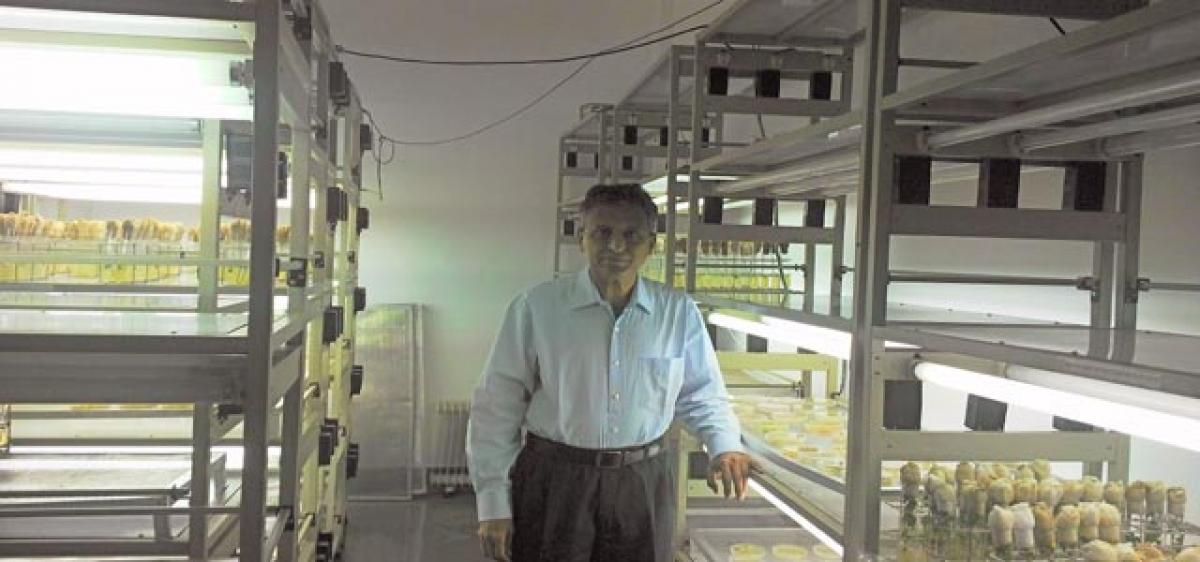Live
- NASA Tracks Five Giant Asteroids on Close Approach to Earth Today
- Pushpa 2 Hits ₹1000 Crore in 6 Days: How It Compares to Other Top Indian Films
- Vivo X200 and X200 Pro Launched in India: Price, Specifications, and Features
- Nitin Gadkari Admits Feeling Embarrassed at Global Summits Over Rising Road Accidents in India
- Comprehensive Review on Indiramma Housing Survey and Welfare Initiatives Conducted via Video Conference
- Jogulamba Temple Records Rs 1.06 Crore Hundi Revenue in 150 Days
- Opposition Slams ‘One Nation, One Election’ Bill as Anti-Democratic; BJP Allies Support the Move
- Celebrate Karthigai Maha Deepam Virtually with Sri Mandir’s LIVE Darshan Experience
- BJP Extends Support to Samagra Shiksha Abhiyan Employees' Strike, Demands Immediate Regularization and Welfare Benefits
- Dr. M. Priyanka Stresses Quality Education, Nutritious Meals, and Cleanliness in Schools
Just In

Interacting with IANS, he spoke of myths associated with DMH-11. He stressed it is safe, has undergone all tests and field trials and that \"unscientific criticism\" had been costing both science and farmers a fortune in the 14 years since it was developed. \"We are living in the age of misinformation. There is so much ignorance around that one can say anything absurd and get away with it,\" Pental sa
New Delhi: As controversy grips the indigenously-developed Genetically Modified (GM) mustard -- a crop which scientists say will address India's food security and farmer's troubles -- the man who developed the variety has termed this an issue "which has gone too far". Dr Deepak Pental, geneticist at Delhi University, has dedicated 30 years of his life to research and led the team that developed Dhara Mustard Hybrid (DMH)-11.
India already consuming GM crops
- BT Cotton is already being consumed in vanaspati
- Edible oil imports, mostly, coming from the GM crops
- GM crops, including soybean and palm, being imported
- Dharma Mustard tech solely funded by public sector
- Thus, there is no fear of monopolies by MNCs
Interacting with IANS, he spoke of myths associated with DMH-11. He stressed it is safe, has undergone all tests and field trials and that "unscientific criticism" had been costing both science and farmers a fortune in the 14 years since it was developed. "We are living in the age of misinformation. There is so much ignorance around that one can say anything absurd and get away with it," Pental said, when asked about the accusations of social and environment activists on the safety of GM Mustard.
Amid stiff opposition from the anti-GM lobby, the fate of the crop depends on a Union Environment Ministry committee. If released, the GM Mustard will, however, "not be the first genetically-engineered food crop produced in India," as oil coming from another GM crop, BT Cotton, is already being consumed in vanaspati (hydrogenated vegetable cooking oil) -- the second-most consumed domestic oil in the country. BT Cotton -- a fibre, food and cattle feed crop -- is grown over 10 million hectares in India and is showing rapid growth since its approval in 2002.
As per government records, India imported in 2015-16 edible oil worth Rs 68,000 crore ($10 billion), most coming from the GM crops such as Canola produced from rapeseed and cultivated over four million hectares in Canada. "That money should have gone to the Indian farmers. The irony is that we are already consuming products from GM crops, including soybean and palm, imported from all over the world; yet (we are) opposing it here," Pental said.
According to Pental, DMH-11 can increase mustard production by 20-30 per cent in its first yield and 40-50 per cent later -- without the use of any fertiliser. Though not customised, it is resistant to white rust, alternaria blight and stem rot -- three common mustard diseases. DMH-11 was developed as a hybrid from Indian and East European mustard using the same technology (but different parent) as done in Canada in the 1990s. "In 1998, GM Mustard in Canada yielded 16 per cent extra which has increased to 38 per cent currently," he said.
Rebuffing assertions that this crop would be monopolised by multinational companies (MNCs) he said: "This is the first technology in the world which is completely funded, owned and patented by the public sector and not multinationals." The crop has undergone field trials for two years in Rajasthan and one year in Punjab and Delhi. Asked about any adverse impact on the environment, the scientist said: "None." Commenting on the claims that GM Mustard would kill bees, he said: "It's all unscientific propaganda. DMH-11 was full of pollen and nectar and bees were feeding just as well. These observations were made and reported."
He also said that the crop proteins were not toxic or allergenic. "From the knowledge on GM crops we gained in the last 30-40 years, all the apprehensions regarding health and environment are wrong. Comprehensive studies were done all over the world and no negative effects could be recorded," Pental said. Hoping his work would be used, Pental seemed confident that once released, farmers would not let GM Mustard go. "Can anyone withdraw BT cotton now?" he asked.
By Kushagra Dixit

© 2024 Hyderabad Media House Limited/The Hans India. All rights reserved. Powered by hocalwire.com







